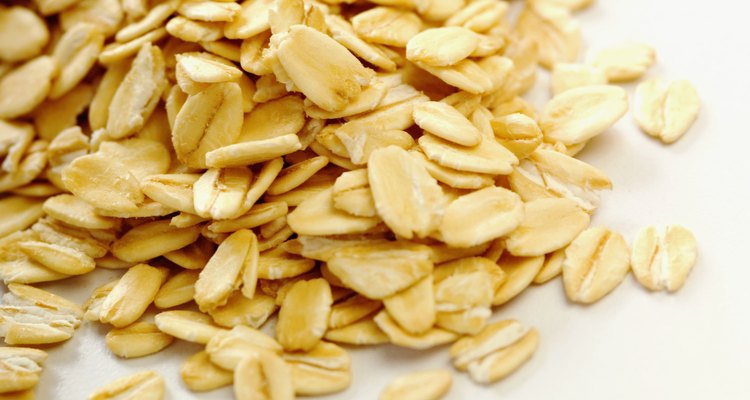
From pancakes to pastries, flour forms the backbone for all kinds of family staples. There's no reason to limit your culinary experiments to different recipes for all-purpose white flour. Up your family’s nutrition, go gluten free or just try a change of taste and texture by using oat flour instead.
Mill Your Own Flour
Oat flour can replace some or all of the regular flour in your baked goods. You can purchase ready-to-use oat flour if your grocery store carries it or easily make it at home in a matter of minutes. To make your own, place old-fashioned oats -- not quick oats or steel-cut oatmeal -- in a blender or food processor. Pulse until the oats reach a powdery consistency. Experiment with coarser versus finer flour to see which you prefer for various baking projects.
Chew On This
Different flours yield differently textured baked goods. Because oats are gluten free and gluten is responsible for the airy texture in baked goods made with wheat flours, foods made with primarily oat flour will be denser and drier than those containing all-purpose flour. A leavening agent such as baking soda will maintain a lighter texture in your baked goods. If your family has dietary restrictions, purchase a certified gluten-free brand of oats to ensure you won't be exposed to any residual gluten from processing.
Switcharoo
When experimenting with oat flour, begin by slowly increasing the proportion of oat flour to all-purpose flour in recipes to acclimate yourself to texture and taste changes. To substitute higher amounts or use only oat flour in a recipe that calls for white or wheat flour, you may find you need to tweak the recipe to add more moisture or leavening agent. Plenty of recipes designed for oat flour are now available, listed as “oat flour cookies” or “oat flour muffins." If you're new to baking with oats, starting with recipes specifically designed for oat flour will produce the tastiest results.
Delicious and Nutritious
Oats are higher in fiber than other flours, meaning your oat-based baked goods will be more nutrient-dense and likely to keep you full for a longer time. According to the U.S. Food and Drug Administration, oats have also been found to reduce the risk of heart disease, thanks largely to their fiber content. Plus, both whole oats and oat flour count as whole grains, meaning it’s easy to get good-for-you grains into all your family’s meals.
Related Articles

Can I Substitute Rolled Oats for Flour ...

How Do Different Types of Flour Affect ...

Substitute for Gram or Besan Flour
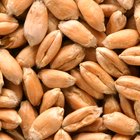
How to Cook Soft Wheat Berries

Uses of Cassava Flour

How to Use Xanthan Gum in Baking

Difference Between Red & White Wheat

Purpose of Rolled Oats in Baking

How to Make Pumpernickel Flour
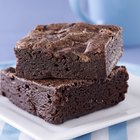
How to Replace Ingredients to Make ...
Can I Grind Quinoa?

Can You Substitute Quick Cook Oats for ...

What Is White Oat?
Cooking With Wheat Vs. White Flour

Can I Substitute Bleached for ...
How To Make Gluten Free Chicken Pot Pie

Bulgar Wheat Vs. Couscous
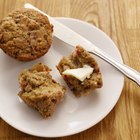
How to Bake With Erythritol
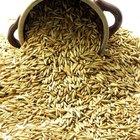
How to Store Oat Bran

Psyllium Husk & Gluten
References
Writer Bio
Tara Mills began writing professionally in 2007. She has contributed to several city/regional lifestyle publications, covering food, home decor, fashion and family entertainment. Mills has also volunteered with animal-rescue organizations, serving companion animals large and small. She holds a Bachelor of Arts in English from North Carolina State University.
Photo Credits
Medioimages/Photodisc/Photodisc/Getty Images